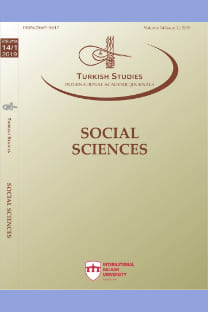The Effect of Group Work on the Personal Development Skills of the Social Work Department Students
Grup Çalışmasının Sosyal Hizmet Bölümü Öğrencilerinin Kişisel Gelişim Becerilerine Etkisi
___
Akfırat, O. N., Öztan Ulusoy, Y., & Kezer, F. (2018). PDR Lisans Programı Öğrencilerinin Mesleki ve Kişisel Gelişimlerine Yönelik Bir Öğretim Tasarımı Uygulaması. Ondokuz Mayıs Üniversitesi Eğitim Fakültesi Dergisi, 117-128.Akın, A., & Başören, M. (2015). Algılanan Empatik Öz-Yeterlik ve Sosyal Öz-Yeterlik Ölçeğinin Türkçe Formunun Geçerlik ve Güvenirliği. Bartın Üniversitesi Eğitim Fakültesi Dergisi, 4(2), 603-610.
Aydın, B., & İmamoğlu, S. (2001). Stresle Başa Çıkma Becerisi Geliştirmeye Yönelik Grup Çalışması. M.Ü. Atatürk Eğitim Fakültesi Eğitim Bilimleri Dergisi(14), 41-52.
Ballı, A. İ., & Kılıç, K. C. (2016). Stresle Başa Çıkma Yöntemleri Ölçeğinin Türkçe'ye Uyarlanması: Geçerlilik ve Güvenirlik Çalışması. Ç.Ü. Sosyal Bilimler Enstitüsü Dergisi, 25(3), 273-286.
Büyüköztürk, Ş., Kılıç Çakmak, E., Erkan Akgün, Ö., Karadeniz, Ş., & Demirel, F. (2008). Bilimsel Araştırma Yöntemleri. Pegem Akademi.
Çakmak, D., & Balaban, Ö. (2016). Üniversite Öğrencilerinin Kişisel Gelişim Eğitimlerine Yönelik Algılarının İncelenmesi. Sakarya İktisat Dergisi, 5(1), 1-17.
Drumm, K. (2006). The Essential Power of Group Work. Social Work with Groups, 29(2-3), 17-31. Dwivedi, K., & Gupta, A. (2000). Keeping cool’: anger management through group work. Support for Learning, 15(2), 76-81.
Erozkan, A. (2013). The Effect of Communication Skills and Interpersonal Problem Solving Skills on Social Self-Efficacy. Educational Sciences: Theory & Practice, 13(2), 739-745.
Lennie, C. (2007, Şubat). The role of personal development groups in counsellor training: understanding factors contributing to self-awareness in the personal development group. British Journal of Guidance & Counselling, 35(1).
Lishman, J. (2015). Kişisel ve Mesleki Gelişim. (Editörler: R. Adams, L. Dominelli, & M. Payne), Sosyal Hizmet Temel Alanlar ve Eleştirel Tartışmalar (s. 427-447). Nika Yayınevi.
Masson, R. L., Jacobs, E. E., Harvill, R. L., & Schimmel, C. J. (2014). Grup Danışmanlığı Stratejileri ve Beceriler. (P. N. Bal, Çev.) Ankara: Pegem Akademi.
McNicoll, P., & Lindsay, J. (2002). Group Work In Social Work Education: The Canadian Experience. Canadian Social Work Review, 19(1), 153-166.
Newsome, S., Waldo, M., & Gruszka, C. (2012). Mindfulness Group Work: Preventing Stress and Increasing Self-Compassion Among Helping Professionals in Training. The Journal for Specialists in Group Work, 37(4), 297–311.
Northen, H., & Kurland, R. (2001). Social Work with Groups (Cilt 3rd Edition). Columbia University Press.
Owen, F. K., & Bugay, A. (2014). İletişim Becerileri Ölçeği’nin Geliştirilmesi: Geçerlik ve Güvenirlik Çalışması. Mersin Üniversitesi Eğitim Fakültesi Dergisi , 51-64.
Öz, S., & Aysan, F. (2012). Öfke Yönetimi Eğitiminin Okul Psikolojik Danışmanlarının Öfkeyle Başa Çıkma ve Güvengenlik Becerilerine Etkisi. Mehmet Akif Ersoy Üniversitesi Sosyal Bilimler Enstitüsü Dergisi, 52-69.
Özkan, Z. (2003). Bilgeliğe Yöneliş Kişisel Gelişim Dinamikleri. Hayat Yayıncılık.
Sezik, N. (2005). Kişisel Gelişim El Kitabı. Hayat Yayıncılık.
Steinberg, D. M. (2010). Mutual Aid: A Contribution to Best-Practice Social Work. Social Work with Groups, 33(1), 53-68.
Tuna, D. T., & Siyez, D. M. (2014). Lise Öğrencilerinin Öfke Kontrolü ve İletişim Becerilerinde Çözüm Odaklı Psiko-Eğitim Programının Etkisi. Türk Psikolojik Danışma ve Rehberlik Dergisi, 11-22.
Tuncer, U. Ç. (2008). İnsan Kaynaklarının Psiko-Sosyal Bakımdan Geliştirilmesi Amacıyla Hazırlanan Gelişim Programlarının Değerlendirilmesine Yönelik Bir Araştırma: MAN Türkiye A.Ş. Örneği. Yüksek Lisans Tezi. Gazi Üniversitesi Sosyal Bilimler Enstitüsü.
Williams, R. (2017). Anger as a Basic Emotion and Its Role in Personality Building and Pathological Growth: The Neuroscientific, Developmental and Clinical Perspectives. Frontiers in Psychology, 1-9.
Yalçın, İ., & Malkoç, A. (2013). Kişisel Gelişim Yönelimi Ölçeği - II'nin Türkçeye Uyarlanması ve Psikometrik Özelliklerinin İncelenmesi. Düşünen Adam The Journal of Psychiatry and Neurological Sciences , 258-266.
- ISSN: 2667-5617
- Yayın Aralığı: 6
- Başlangıç: 2006
- Yayıncı: ASOS Eğitim Bilişim Danışmanlık Otomasyon Yayıncılık Reklam Sanayi ve Ticaret LTD ŞTİ
Görsel İmgeleme Aracı Olarak Mekânın Arka Planını Semiyolojik Çerçevede İncelemek
Kübra MERTEL, Serdar BOZKURT, Ayşe DEMİRHAN
The Soul - Body Relation İn İslamic Philosophy
Bangladeş'teki Rohingya Mülteci Çocukları ve Onların Kimlik Krizi Üzerine Eleştirel Bir Araştırma
Mohammad Alam Chowdhury, Akkas Ahamed, Md. Sayedur Rahman
Kovid-19 from Social Work Perspective: Psychosocial Effects and Social Transformations
Nurullah YELBOĞA, Nesrin AÇIKGÖZ
Toplumsal Değişme Sürecinde Yaşlı Bireylerin Yaşlılık Algısı
Analyzing the Background of the Space in a Semiological Framework as a Visual Imaging Tool
Grup Çalışmasının Sosyal Hizmet Bölümü Öğrencilerinin Kişisel Gelişim Becerilerine Etkisi
Taner Artan - Fatih Cebeci, Merve Karaman
Evaluation Of The Place Of Urban Livability Concept In The Literature
Sema ÇETİNKAYA, Alpaslan ALİAĞAOĞLU
A Comparison of the Ego Identity Statuses of the Adolescents: According to Family Environment Type
